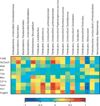Responses of gut microbiota to diet composition and weight loss in lean and obese mice
- PMID: 21593810
- PMCID: PMC3871199
- DOI: 10.1038/oby.2011.111
Responses of gut microbiota to diet composition and weight loss in lean and obese mice
Abstract
Maintenance of a reduced body weight is accompanied by a decrease in energy expenditure beyond that accounted for by reduced body mass and composition, as well as by an increased drive to eat. These effects appear to be due--in part--to reductions in circulating leptin concentrations due to loss of body fat. Gut microbiota have been implicated in the regulation of body weight. The effects of weight loss on qualitative aspects of gut microbiota have been studied in humans and mice, but these studies have been confounded by concurrent changes in diet composition, which influence microbial community composition. We studied the impact of 20% weight loss on the microbiota of diet-induced obese (DIO: 60% calories fat) mice on a high-fat diet (HFD). Weight-reduced DIO (DIO-WR) mice had the same body weight and composition as control (CON) ad-libitum (AL) fed mice being fed a control diet (10% calories fat), allowing a direct comparison of diet and weight-perturbation effects. Microbial community composition was assessed by pyrosequencing 16S rRNA genes derived from the ceca of sacrificed animals. There was a strong effect of diet composition on the diversity and composition of the microbiota. The relative abundance of specific members of the microbiota was correlated with circulating leptin concentrations and gene expression levels of inflammation markers in subcutaneous white adipose tissue in all mice. Together, these results suggest that both host adiposity and diet composition impact microbiota composition, possibly through leptin-mediated regulation of mucus production and/or inflammatory processes that alter the gut habitat.
Conflict of interest statement
The authors declared no conflict of interest.
Figures





Similar articles
-
Panax notoginseng saponins modulate the gut microbiota to promote thermogenesis and beige adipocyte reconstruction via leptin-mediated AMPKα/STAT3 signaling in diet-induced obesity.Theranostics. 2020 Sep 14;10(24):11302-11323. doi: 10.7150/thno.47746. eCollection 2020. Theranostics. 2020. PMID: 33042284 Free PMC article.
-
Diet-induced obese mice are leptin insufficient after weight reduction.Obesity (Silver Spring). 2009 Sep;17(9):1702-9. doi: 10.1038/oby.2009.106. Epub 2009 Apr 16. Obesity (Silver Spring). 2009. PMID: 19373220 Free PMC article.
-
Dietary α-lactalbumin alters energy balance, gut microbiota composition and intestinal nutrient transporter expression in high-fat diet-fed mice.Br J Nutr. 2019 May;121(10):1097-1107. doi: 10.1017/S0007114519000461. Epub 2019 Mar 5. Br J Nutr. 2019. PMID: 30834845
-
Obesity and the gut microbiota.J Clin Gastroenterol. 2011 Nov;45 Suppl:S128-32. doi: 10.1097/MCG.0b013e31821f44c4. J Clin Gastroenterol. 2011. PMID: 21992951 Review.
-
Resistant starch and energy balance: impact on weight loss and maintenance.Crit Rev Food Sci Nutr. 2014;54(9):1158-66. doi: 10.1080/10408398.2011.629352. Crit Rev Food Sci Nutr. 2014. PMID: 24499148 Free PMC article. Review.
Cited by
-
Depletion of the gut microbiota differentially affects the impact of whey protein on high-fat diet-induced obesity and intestinal permeability.Physiol Rep. 2021 Jun;9(11):e14867. doi: 10.14814/phy2.14867. Physiol Rep. 2021. PMID: 34057306 Free PMC article.
-
The role of the manipulation of the gut microbiota in obesity.Curr Infect Dis Rep. 2013 Feb;15(1):25-30. doi: 10.1007/s11908-012-0301-5. Curr Infect Dis Rep. 2013. PMID: 23129415
-
Investigating the demographic history of Japan using ancient oral microbiota.Philos Trans R Soc Lond B Biol Sci. 2020 Nov 23;375(1812):20190578. doi: 10.1098/rstb.2019.0578. Epub 2020 Oct 5. Philos Trans R Soc Lond B Biol Sci. 2020. PMID: 33012223 Free PMC article.
-
Pyrosequencing the canine faecal microbiota: breadth and depth of biodiversity.PLoS One. 2013;8(1):e53115. doi: 10.1371/journal.pone.0053115. Epub 2013 Jan 31. PLoS One. 2013. PMID: 23382835 Free PMC article.
-
Modulation of Adipocyte Metabolism by Microbial Short-Chain Fatty Acids.Nutrients. 2021 Oct 19;13(10):3666. doi: 10.3390/nu13103666. Nutrients. 2021. PMID: 34684670 Free PMC article. Review.
References
-
- Flegal KM, Carroll MD, Ogden CL, Curtin LR. Prevalence and trends in obesity among US adults, 1999–2008. JAMA. 2010;303:235–241. - PubMed
-
- MacLean PS, Higgins JA, Johnson GC, et al. Enhanced metabolic efficiency contributes to weight regain after weight loss in obesityprone rats. Am J Physiol Regul Integr Comp Physiol. 2004;287:R1306–R1315. - PubMed
-
- Hambly C, Speakman JR. Contribution of different mechanisms to compensation for energy restriction in the mouse. Obes Res. 2005;13:1548–1557. - PubMed
-
- Rosenbaum M, Vandenborne K, Goldsmith R, et al. Effects of experimental weight perturbation on skeletal muscle work efficiency in human subjects. Am J Physiol Regul Integr Comp Physiol. 2003;285:R183–R192. - PubMed
Publication types
MeSH terms
Substances
Grants and funding
- 5P30DK026687/DK/NIDDK NIH HHS/United States
- P01 DK078669/DK/NIDDK NIH HHS/United States
- HG4872/HG/NHGRI NIH HHS/United States
- 5R01DK064773/DK/NIDDK NIH HHS/United States
- U01 HG004866/HG/NHGRI NIH HHS/United States
- HG4866/HG/NHGRI NIH HHS/United States
- P30 DK026687/DK/NIDDK NIH HHS/United States
- R01 DK052431/DK/NIDDK NIH HHS/United States
- DK78669/DK/NIDDK NIH HHS/United States
- HHMI/Howard Hughes Medical Institute/United States
- DK063608-08/DK/NIDDK NIH HHS/United States
- R01 DK064773/DK/NIDDK NIH HHS/United States
- R01 HG004872/HG/NHGRI NIH HHS/United States
- P30 DK063608/DK/NIDDK NIH HHS/United States
- 5R01DK052431/DK/NIDDK NIH HHS/United States
LinkOut - more resources
Full Text Sources
Other Literature Sources
Medical
Molecular Biology Databases

